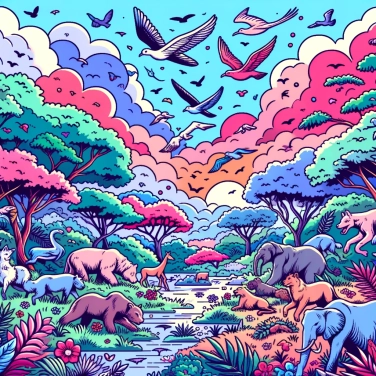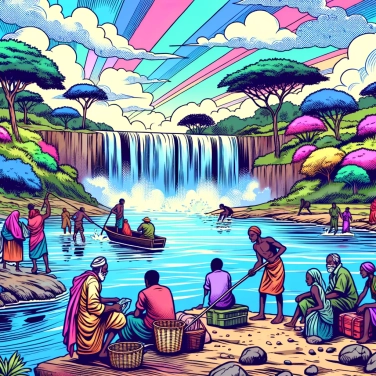In detail, for those interested!
Cultural and heritage wealth
The Epupa Falls, located along the Kunene River at the border between Namibia and Angola, represent a site of great cultural and heritage importance for the indigenous Himba and Zemba peoples. These communities consider the falls as sacred and incorporate them into their ancestral rites and traditions. The Epupa Falls are an essential element of the cultural identity of these ethnic groups, symbolizing the spiritual connection with nature and ancestors. Every year, ritual ceremonies and festivities are organized there, strengthening the bond between the inhabitants and their historical past.
Economic importance for local communities.
The Epupa Falls have significant economic importance for the local communities living in the region. Indeed, they are an essential source of income for many families who depend on tourism to survive. Thanks to the influx of visitors attracted by the natural beauty of the falls, locals have the opportunity to sell local handicrafts, offer guiding and accommodation services, and showcase their unique culture through traditional performances.
Furthermore, the tourist activity generated by the Epupa Falls stimulates the local economy by creating a variety of jobs, ranging from lodge management to souvenir sales. This allows residents to diversify their sources of income and actively participate in the economic development of their community. This economic dynamic helps strengthen the social fabric by promoting cooperation among different local actors and encouraging investment in sustainable projects for the future.
Impact on tourism and sustainable development
The Epupa Falls are a major tourist attraction in the region, attracting visitors from around the world. These spectacular falls offer unique opportunities for adventure tourism and ecotourism. Moreover, preserving the environment around the falls is crucial to ensure sustainable development in the region. The revenue generated by tourism around the falls directly contributes to the local economy, thus supporting the surrounding communities. The positive impact of tourism on the Epupa Falls reinforces awareness of the need to preserve this fragile ecosystem for future generations.
![Explain why some countries change time zones?]()
![Explain why Alexander the Great refused to wear shoes.]()
![Explain why Alexander the Great always wore an impressive helmet.]()
![Explain why the last Chinese emperor was so young when he came to power?]()





















